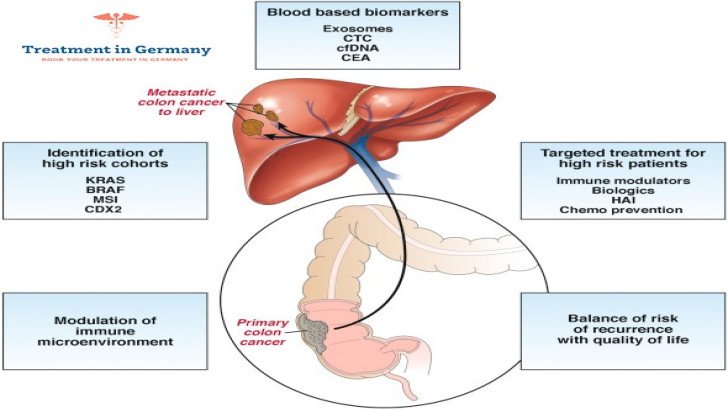
Colorectal cancer, encompassing cancers of the colon and rectum, is a prevalent malignancy with a high propensity for liver metastasis, affecting up to 50% of patients.
Germany remains a global leader in advanced oncology, excelling in the early recognition of signs of liver metastasis from colorectal cancer. Colorectal cancer (CRC) patients, particularly those with liver metastasis, benefit from enhanced disease detection, precision diagnostics, and personalized treatment plans facilitated by Germany’s expertise.
Colorectal cancer, encompassing cancers of the colon and rectum, is a prevalent malignancy with a high propensity for liver metastasis, affecting up to 50% of patients. This occurs when cancer cells spread from the primary tumor to the liver via the bloodstream or lymphatic system. Risk factors include obesity, inflammatory bowel disease, genetic predispositions (e.g., Lynch syndrome), and advanced CRC stages. German oncology centers lead in integrating advanced imaging, biomarker testing, and clinical trials to enhance disease detection and patient outcomes for those with liver metastasis.
Early identification of signs of liver metastasis from colorectal cancer is critical for timely treatment and improved prognosis. These signs may emerge as the disease progresses or as new symptoms in patients with a CRC history. Common signs include:
These signs may mimic other liver conditions, necessitating heightened diagnostic awareness. German gastroenterologists and oncologists train patients and healthcare providers to recognize these indicators for effective disease detection.
Survival Outcomes in Colorectal Cancer with Liver Metastasis: This chart highlights the improved disease-free survival in patients receiving advanced therapies, underscoring Germany’s leading role in early detection and effective intervention.
Enhancing Diagnostic Awareness for Liver Metastasis
Diagnostic awareness is essential for identifying liver metastasis from colorectal cancer in its early stages. German oncology centers employ comprehensive diagnostic strategies:
German radiologists and pathologists ensure rapid, precise diagnostics, enabling personalized treatment plans for liver metastasis patients.
Clinical Insights into Signs of Liver Metastasis
Germany’s clinical insights in 2025 provide a deeper understanding of signs of liver metastasis from colorectal cancer, supported by research advancements and patient data.
Symptom Evolution and Progression
Research indicates that abdominal pain and jaundice often emerge as liver metastasis grows beyond 2-3 cm. The German CRC Registry notes that fatigue and weight loss intensify in 65% of patients with multiple liver lesions, signaling advanced disease progression.
Risk Stratification and Screening
German oncologists stratify CRC patients for liver metastasis risk:
Emerging Research and Trials
Ongoing clinical trials in Germany explore sign detection:
Why Germany Excels in Detecting Liver Metastasis
Germany offers unparalleled expertise for CRC patients with liver metastasis:
Risk Factors and Prevention Strategies for Liver Metastasis
Preventing liver metastasis progression supports diagnostic efficacy. Key risk factors include:
German specialists recommend regular colonoscopy, imaging, and lifestyle changes to reduce metastasis risk.
Comprehensive Multidisciplinary Cancer Detection
Germany’s multidisciplinary cancer detection integrates:
This approach optimizes patient outcomes.
Post-Detection Support and Enhancing Quality of Life
Post-detection care includes:
Challenges and Future Horizons
Challenges include delayed sign recognition and imaging limitations. German researchers address these through:
Future clinical advancements promise enhanced disease detection.
Conclusion
Germany’s focus on signs of liver metastasis from colorectal cancer offers hope through improved diagnostic awareness, clinical insights, and holistic health approaches. With multidisciplinary cancer detection and advanced diagnostics, German oncology centers achieve superior survival prospects and quality of life, positioning Germany as a global leader in liver metastasis care.
Frequently Asked Questions
What are the key signs of liver metastasis from colorectal cancer to watch for in 2025?
Signs include abdominal pain, jaundice, unexplained weight loss, fatigue, swelling or ascites, loss of appetite, and elevated liver enzymes, especially in CRC patients, prompting MRI or CT screening.
How does liver metastasis from colorectal cancer differ from primary liver cancer symptoms?
Liver metastasis from CRC often presents with abdominal pain and jaundice due to secondary tumor spread, while primary liver cancer may include cirrhosis-related signs, requiring diagnostic differentiation via imaging and biopsies.
What diagnostic methods are used to confirm liver metastasis from colorectal cancer in Germany?
Germany employs multiparametric MRI, contrast-enhanced CT, PET-CT, CEA testing, liver function tests, and image-guided biopsies to ensure diagnostic accuracy for personalized treatment plans.
Are there specific clinical trials in Germany focusing on detecting liver metastasis from colorectal cancer?
Yes, trials like the META-CRC Trial and LIVER-SURV Study explore imaging, biomarker combinations, and AI-driven analysis to enhance early detection rates and disease surveillance for liver metastasis.
What follow-up care is provided after detecting liver metastasis from colorectal cancer in Germany?
Comprehensive care includes ongoing surveillance with CEA tests and imaging, rehabilitation for fatigue or weight loss, and emotional wellness support through counseling and support groups, ensuring sustained quality of life.
How does Germany compare to the UK or US in detecting liver metastasis from colorectal cancer?
Germany excels with advanced diagnostic facilities, rapid access to clinical trials, expert multidisciplinary teams, and holistic health approaches, offering superior disease detection compared to many international peers.
Can recognizing signs prevent liver metastasis progression from colorectal cancer?
Early sign recognition and timely treatment (e.g., liver resection or chemotherapy) can reduce progression risk by 20-25% when metastasis is detected at 1-2 cm, as supported by German research.
Does Germany support international colorectal cancer patients with liver metastasis?
Yes, hospitals in Germany provide language assistance, travel coordination, and emotional wellness programs to ensure seamless detection and care for global CRC patients with liver metastasis.
What are the most promising approaches for detecting signs of liver metastasis in Germany?
AI-enhanced imaging, PET-CT advancements, new biomarker development (e.g., CA 19-9 trends), and integrated diagnostic protocols are pushing the boundaries of disease detection for liver metastasis.
How do patients experience the benefits of early sign detection compared to late-stage diagnosis?
Patients benefit from earlier treatment options, reduced symptom severity, and improved quality of life with early sign detection, which minimizes invasive procedures and enhances survival prospects, a key focus in German patient care programs.
For more information or a free consultation, visit our contact us page.